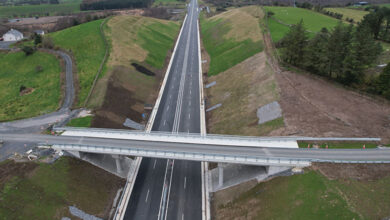Construction skills capacity exceeded

As Irish construction continues its recovery, a majority of construction companies are reporting that they are operating at full capacity, but almost nine out of every 10 have reported shortages in numerous construction-related trades.
The volume of Irish construction contracted by almost two-thirds between 2007 and 2012. Construction had once represented almost one-quarter of Irish GNP but by 2015, it was reduced to only 6.2 per cent. Employment levels at one point hit 35 per cent of their 2007 levels. The numbers of workers who left the industry and indeed the country at that time are now coming back to haunt the country as Rebuilding Ireland, Project Ireland 2040 and the Public Capital Programme precipitate high demand of a workforce lacking in the requisite skills.
A 2017 survey conducted by DKM, Demand for Skills in Construction to 2020, found that there were 162,800 people working in construction related occupations at that point in the recovery, with 80 per cent, some 130,020, of those working in construction proper. The report predicted that the figure would rise to 213,000 by 2020, meaning that a further 112,000 construction workers would be needed to enhance the industry and replace the workers that would leave in the meantime. The most recent Construction Industry Federation report, published in 2019, shows that the number of those in construction proper rose to 145,500 in 2018.
The Construction Market Monitor 2019, jointly compiled by the Society of Chartered Surveyors Ireland and PwC, recently reported that there was “tempered optimism for a sector hampered by acute skills shortages”. 56 per cent of respondents to the survey claimed to be working at full capacity, a 17 per cent rise from 2018, with almost 60 per cent reporting an increase in activity. With almost one-third reporting no change in overall activity levels, it was found that public housing and infrastructure construction had risen in activity, but this rise had been mitigated by a fall in private construction.
“Attracting and retraining key talent is the single key constraint hampering growth in the Irish construction sector,” the report states. The survey within shows a “further decline in the level of available talent in the Irish construction sector”. Most construction related trades within the survey report shortages that became even more acute in 2019. In the categories of quantity surveyors, civil engineers, bricklayers, carpenters, electricians and plumbers, only quantity surveyors reported an increase in shortages in 2018, but all reported increases in 2019 and rose past their 2017 levels. 88 per cent of respondents experienced shortages seeking quantity surveyors and carpenters, 87 per cent seeking bricklayers, 82 per cent seeking electricians and 71 per cent seeking civil engineers.
There has been a 15 per cent rise in overall apprenticeship registrations, but bricklaying and plastering numbers are at 12 per cent and 9 per cent respectively of their 2004 peaks. The report welcomes the sustained investment in construction through Project Ireland 2040 and also points to a joint Technological University Dublin/CIF study that called for the introduction of a new grant system aimed at companies that employ apprentices in trades suffering from shortages. It then states: “Further significant investment in education and training is required along with a collaborative effort between industry stakeholders and government to ensure that the capacity of the industry is expanded and the ambitious investment and development plans as well as much needed residential housing supply can be delivered upon.”





